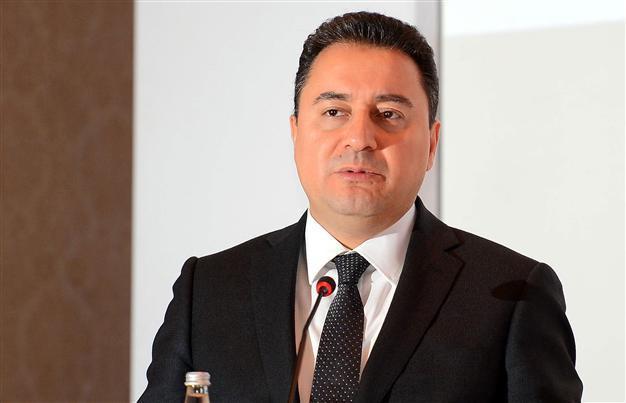Government’s 5th and 6th judiciary packages on the way

Turkey’s deputy prime minister Ali Babacan. AA photo
The Turkish government has started preparations for two new judicial reform packages after a fourth one became the subject of fierce debate in Parliament. The preparations were revealed by Ali Babacan, Turkey’s deputy prime minister in charge of the economy, during a keynote speech to the EurAsiaMed chapter of the Confederation of Italian Enterpreneurs Worldwide (CIIM) in Istanbul yesterday.Answering a question about the risks ahead of the Turkish economy in the next five years, Babacan said the biggest problem was the deficits in the legal bases of the economy and that these would be overcome with the “fifth and sixth judicial reform packages” which the government has started to outline.
That is interesting, since the government was accused by opposition parties during the debates on the fourth one for not implementing all the corrections at once, especially those regarding human rights and democratization in order to use the new steps as a bargaining chip in the Kurdish “peace process” as Prime Minister Tayyip Erdoğan calls it. The spokespersons for the ruling Justice and Development Party (AK Parti) have tried to avoid giving clear answers to those claims so far and accused opposition deputies of trying to undermine the peace process.
Answering the Hürriyet Daily News’ questions following the CIIM meeting, Babacan did not give any details about the new packages, saying it would be “inappropriate” to say something that is the responsibility of the Justice Ministry. He only said the reform packages would not be exclusively on the legal bases of the economy but economic chapters would be included in those packages. Babacan said the timing for the new packages was not set yet and that they would be brought to Parliament’s attention when “the political atmosphere is ripe.” There is no statement so far on the issue by the Justice Ministry.
Addressing Italian investors, Babacan also revealed more details on Turkey’s economic outlook and projects. “Turkey has achieved a lot in democratization and the economy in the last 10 years, but we know that we have still a way to go,” Babacan said. “The market economy should be based on rules; we are trying to harmonize our rules to Olympic standards.” He used the analogy twice and said Turkey’s Olympic bid for 2020 would help improve the physical infrastructure of Istanbul which he said was the second necessity for making Istanbul among the “top 10 financial centers in the world,” while also mentioning the two underwater Bosporus tunnels, the third bridge over it, connecting European and Asian headquarters of the city, a huge (third) airport and a waterway (Kanalİstanbul) to connect the Black Sea to Marmara, parallel to the Bosphorus. The first condition for BorsaIstanbul (BIST) to be among the top 10 is Turkey’s “legal base,” according to Babacan, who is regarded internationally as the Turkish economy’s silent captain.
Babacan said there would be other measures in order to strengthen the Turkish economy’s structure before and with the new reform packages, including new laws on the banking system and the use of credit cards and the establishment of Specialized Financial Courts, in which judges and prosecutors with economic and financial backgrounds would work. “No, we are not going to put new taxes on foreign investors for more revenues,” Babacan said. “That is not the way to attract them to be in the top 10.”
Headed by Turkish-Italian businessman Aldo Kaslowski, the EurAsiaMed chapter of the CIIM has been in close cooperation with the Turkish government in recent years. In 2012, Babacan addressed the Italian business community in the United States in a New York meeting, inviting them to invest in Turkey thanks to the CIIM organization; this year, a similar meeting is expected to take place in Rio, Brazil.
Babacan describes Turkish-Italian relations as “excellent,” adding with a smile that he was not just “paying lip service” as a former foreign minister.











